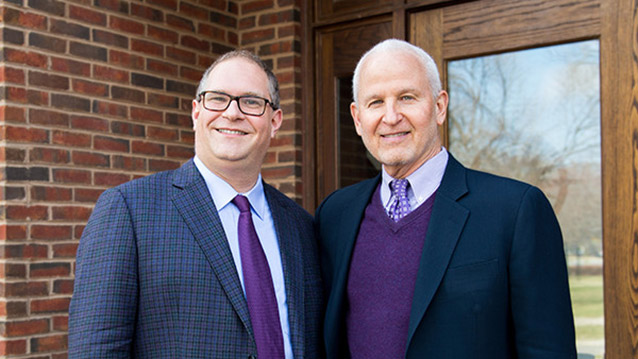Northwestern University School of Education and Social Policy Professor David Figlio and Northwestern University President and Professor Morton Schapiro have been elected to the prestigious National Academy of Education.
Figlio, the incoming dean of the School of Education and Social Policy (SESP), and Schapiro have made indelible marks on education through their scholarship.
An honor society, the National Academy advances high-quality research to inform and improve education policy and practice — a mission to which SESP has contributed significantly through the research of its faculty.
Figlio and Schapiro, research collaborators, join an impressive list of SESP faculty members previously elected to the academy, including Dean Penelope Peterson; professors Carol Lee, Lindsay Chase-Lansdale, Larry Hedges, Douglas Medin and James Spillane; and professor emeritus Allan Collins.
“I'm delighted to have two of our distinguished faculty members join the illustrious group of SESP faculty who are already members of the National Academy of Education,” said Peterson, the Eleanor R. Baldwin Professor of Education who was elected to the academy in 2011.
The academy consists of 209 U.S. members, who are elected on the basis of outstanding scholarship related to education.
Schapiro holds an appointment in the School of Education and Social Policy. Figlio, an economist and director of the Institute for Policy Research, will take the helm of the school Sept. 1, succeeding Peterson, the school's longest serving dean, who is retiring after two trailblazing decades.
“The election of new members to the academy is a testament to their scholarly contributions in a wide range of areas, and to our abiding commitment to infuse education policy debates with knowledge from research. It is a pleasure and honor to welcome them,” said Michael Feuer, president of the National Academy of Education and dean of the Graduate School of Education and Human Development at George Washington University.
David Figlio
David Figlio, the Orrington Lunt Professor of Education and Social Policy, is internationally renowned for his scholarship on school accountability, school choice, school standards, welfare policy and policy design, intergenerational issues in health and education, and student learning outcomes in higher education.
As director of the Institute for Policy Research since 2012, he has spearheaded significant change, including restructuring support staff roles, establishing new systems of shared governance and decision-making, launching new collaborations with other institutes and schools across Northwestern, and inspiring collaborative ventures with partners, including the Evanston and Chicago public school districts.
Morton Schapiro
Morton Schapiro, the 16th president of Northwestern and a professor of economics in the Weinberg College of Arts and Sciences, holds appointments in SESP as well as the Kellogg School of Management. He is among the nation's leading authorities on the economics of higher education.
Schapiro has written on college financing and affordability and trends in educational costs and student aid, including “The Student Aid Game: Meeting Need and Rewarding Talent in American Higher Education,” “Paying the Piper: Productivity, Incentives and Financing in Higher Education,” and “Keeping College Affordable: Government and Educational Opportunity.” His forthcoming book, “Cents and Sensibility: What Economics Can Learn from the Humanities,” co-authored with Gary Saul Morson, will be out in June.
Schapiro was elected as a fellow of the American Academy of Arts and Sciences in 2010.
Research collaborators
Figlio and Schapiro are research collaborators. In a recent study released by the Brookings Institution, Schapiro and Figlio used data collected from the population of first-year undergraduates at Northwestern between fall 2001 and fall 2008 to answer the question: “Are Great Teachers Poor Scholars?”
A study co-authored by the two in 2015 compared learning outcomes for undergraduates in classes with tenure-track and non-tenure-track faculty and found that non-tenure-track faculty in introductory classes boost student learning.
A current research project, with Kellogg faculty member Paola Sapienza, examines the impact of grades in introductory courses on the selection of academic majors, with special emphasis on the leakage of women and members of underrepresented groups from STEM fields.


